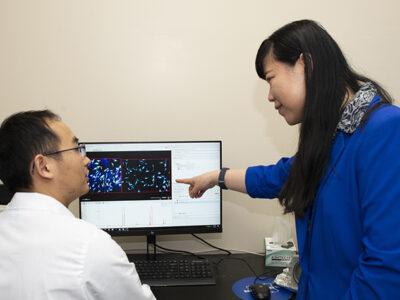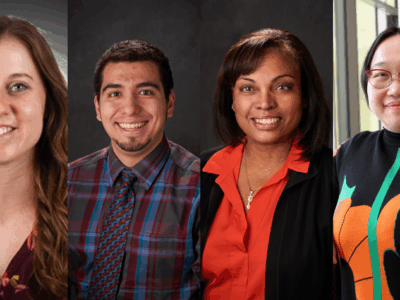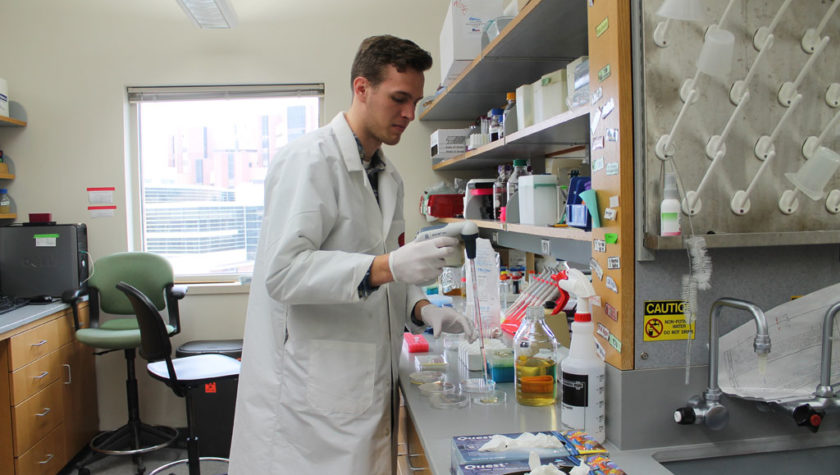
2
March

School’s undergrad program offers broad research opportunities from exploring fish endocrinology to fighting antibiotic resistance
By Katie Gerhards
With diverse research opportunities built into its curriculum, the Pharmacology–Toxicology bachelor’s degree program offered by the University of Wisconsin–Madison School of Pharmacy is giving undergraduate students a critical advantage. By the end of four semesters of study, students have a solid foundation in basic research skills and are prepared for the types of research challenges that emerge in graduate school and in industry.
“We strive to offer students in the Pharm-Tox program an interdisciplinary and research-driven curriculum, covering the breadth of basic science as well as depth in pharmacology and toxicology,” explains Jeff Johnson, a professor in the Pharmaceutical Sciences Division and director of the Pharm-Tox Program.
“My [Pharm-Tox] research experience has allowed me to explore different career pathways that I never knew existed prior to joining a lab.”
–Charlotte Urban
Much of the Pharm-Tox students’ coursework is focused on basic foundational science, in addition to research in a broad range of biological and physical sciences that supports learning. “As a top-tier research university, we encourage our students to pursue research in whatever departments or areas interest them, including biochemistry, animal science, entomology, chemistry, and pharmaceutical sciences,” says Kendra Gurnee, Pharm-Tox program coordinator.
Providing students with research experience early in their studies has a wide range of benefits. Students learn to work independently and with confidence, and they develop a clearer idea of their career goals. “My research experience has allowed me to explore different career pathways that I never knew existed prior to joining a lab,” says Charlotte Marie Urban, a junior at UW–Madison who is in her first year in the Pharm-Tox program.
Cross-campus collaboration
Urban is fulfilling her research requirements for her Pharm-Tox degree in the Department of Medical Microbiology and Immunology, where she is designing a gene editing system to create mutants of the parasite Toxoplasma gondii. She hopes that her research will shed light on genetic and metabolomic phenomena that could help improve the treatment of T. gondii infection, the cause of toxoplasmosis, a disease that can seriously damage the central nervous system.
“Through doing research I have discovered that I have a passion for understanding how microbes affect the human body,” Urban says. “This has made me realize that I want to pursue a career in medicine.”
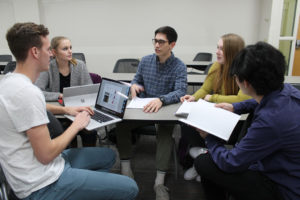
The Pharm-Tox faculty place high value on the participation of undergraduate students in research, such that research experience—involving tissues, cells, biochemical techniques, molecular biology techniques, or chemical synthesis—is a required component of the curriculum.
“The research opportunities help students build connections with faculty and students, and that networking can be helpful in exploring post-graduation career options, as well as pursuing them,” Gurnee says. “Collaborating in a team, problem solving, communicating with groups, training and teaching others, explaining their work, and citing sources will help students further their careers regardless of where they take their Pharm-Tox degree.”
Many students enjoy the research aspect of the program and ultimately take multiple semesters of research courses. Through their research projects, Pharm-Tox students also learn how to collaborate with professionals and help strengthen collaborations between the School of Pharmacy and other departments on the UW–Madison campus.
Yusen Men, a UW–Madison senior and first-year student in the Pharm-Tox program, has made important research contributions for the laboratory of Hiroshi Maeda, an associate professor in the Department of Botany. Men is already published as a co-author in the journals Frontiers in Molecular Biosciences and Nature Chemical Biology for his research on the biochemical characterization of microbial enzymes of tyrosine biosynthesis to trace the origin of plants ADH enzyme.
“The research experience I’ve had not only consolidates my current knowledge but also enhances my biochemical experiment techniques.”
–Yusen Men
“Yusen Men has been doing exceptional work in my lab,” says Maeda, whose lab focuses on understanding the organization and regulatory mechanisms of plant shikimate and aromatic amino acid pathways—specifically defining the tyrosine biosynthetic pathway in plants.
“The research experience I’ve had not only consolidates my current knowledge but also enhances my biochemical experiment techniques,” says Men, who plans to pursue a research career and earn a PhD in the pharmaceutical or biomedical field. “The experience is really wonderful and has taught me many things. It encourages me to do research at a high level and trains me to think like a scientist.”
Lauren Penn, a junior and first-year student in the Pharm-Tox program, is carrying out research on fish endocrinology in the Department of Animal Science under the guidance of Professor Terence Barry. Penn’s research project is aimed at identifying components in the skin of yellow perch and determining whether those components influence behavioral or growth responses.
“We are measuring the expression levels of key growth hormones in a variety of tissues,” Penn says. “This data could help us enhance the field of aquaculture by manipulating this mechanism and rearing larger fish in less time, as yellow perch is currently one of the slowest growing species.”
Exploring research within pharmacy
While the Pharm-Tox program welcomes collaborative research endeavors, it also supports many students who use the research requirement to delve more deeply into the world of pharmacy, mainly through the School’s Pharmaceutical Sciences Division or Pharmacy Practice Division.
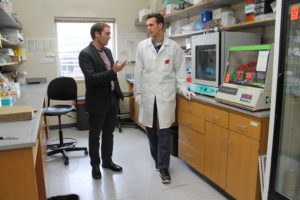
Aaron Rottier, who will graduate from the Pharm-Tox program in May 2018, wanted to study a growing problem that has the potential to be a global public health threat: antibiotic resistance. Under the guidance of Pharmacy Practice Division Associate Professor Warren Rose, Rottier is investigating the antimicrobial mechanisms of currently approved antibiotics when used in combination together. This understanding, Rottier says, will help health care providers to select antibiotic combinations strategically to enhance the killing of the microbe and avoid the development of resistance.
“Aaron’s productivity and motivation would put him near the top of the list of students I’ve worked with,” says Rose. “I think he would be here at all times of the day if he could.”
After graduation, he plans to begin medical school at the UW–Madison School of Medicine and Public Health. Hopefully, he says, he’ll end up in a career that consists of both seeing patients and continuing to participate in the research community to push health care forward. “The pre-exposure to this type and amount of material in my Pharm-Tox undergraduate courses has positioned me well to begin medical school with a strong base of knowledge and set of adaptable study skills,” says Rottier.
“We try to answer patients’ questions in the lab, so Aaron’s research here will inform what he’ll learn in medical school,” adds Rose.
Thomas Chitwood, who is also set to graduate from the Pharm-Tox program in May, actually aims to become a dentist, but says his research experience in the School’s Pharmaceutical Sciences Division has taught him the duality of science and art at play in both fields. “Although organic chemistry is a central science, the physical execution of chemical synthesis is, in my opinion, an art form.”
Chitwood, in the lab of Associate Professor Charles Lauhon, who is also vice chair of the Pharmaceutical Sciences Division, is attempting to synthesize a multisubstrate analogue inhibitor of lysidine synthetase, which is a bacterial tRNA modification enzyme. Although this doesn’t sound much like Rottier’s work, the research is to the same end: fighting antibiotic resistance.
“Ultimately, the Pharm-Tox program goes well above and beyond the classroom and the raw knowledge we gain.” –Lauren Penn
“This multisubstrate analogue inhibitor is a molecule that, when synthesized, will hopefully bind to our target enzyme, lysidine synthetase, to inhibit its action and open the door to a new antibiotic class,” Chitwood explains. “Without being a part of the Pharm-Tox program, I know I would not have found this opportunity or built this excellent scholarly relationship with Dr. Lauhon, a renowned and estimable professor.”
Preparing for the future
While providing pharmacy undergraduate students with learning and research opportunities in both pharmacology-toxicology and a variety of scientific fields, the Pharm-Tox program is also preparing them for life on the road ahead. Through successes and failures, students learn how to problem solve and develop skills that help them adapt and create new courses of action. Such skills are not only valuable in academics and research but also are applicable to challenges Pharm-Tox students may face in other aspects of their lives.
According to Penn, research experience provides key opportunities for skill-building, particularly when it comes to communication, teamwork, and attention to detail. These skills, she says, will help her in whatever field she intends to pursue.
Men says his research experience has further provided insight into graduate school and expectations in academic and research performance. “I have decided to get a PhD degree after graduation, so my experience in the Pharm-Tox program really helps me prepare for that. While working in the lab, I am in contact with my advisor and many graduate students, who often share their views with me. Their suggestions can guide me when I am pursuing my career goal.”
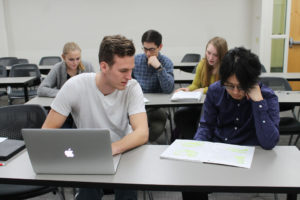
Such learning, research, and skill-building opportunities have proven to be greatly beneficial to Pharm-Tox undergraduates. In 2017, Rottier and fellow Pharm-Tox students Sam Boroumand and Julia Chini, who currently are seniors at UW–Madison, were named UW–Madison Hilldale Undergraduate/Faculty Research Fellowship Awardees. Each student received $3,000 as part of the award, along with an additional $1,000 to offset research costs, leaving them well-poised for success in their academic and professional pursuits. A Pharm-Tox student has won the Hilldale Fellowship every year for the last four years.
Since the mid-1980s, when the Pharm-Tox program was first developed, more than 360 students have graduated with a BS degree in Pharmacology-Toxicology from UW–Madison. Many of those graduates have gone on to earn a PharmD, PhD, or MD, and many have remained in academia, becoming professors in a wide range of fields, including chemistry, epidemiology, neuroscience, and toxicology.
But academia isn’t always the goal, and Pharm-Tox students are highly qualified candidates for many industry roles at a wide range of companies. Of the 151 Pharm-Tox graduates between 2008 and 2017, almost one-quarter landed jobs in industry right after graduation, taking positions at companies such as S.C. Johnson, Millipore Sigma, and Promega Corporation.
“Ultimately, the Pharm-Tox program goes well above and beyond the classroom and the raw knowledge we gain,” Penn says. “The deep academic and scientific foundations provided by the program leave graduates well-placed and ready to make meaningful contributions to science and health research.”
Learn more about the Pharm-Tox program at the School of Pharmacy or download a printable brochure.
Read about Pharm-Tox alum Katherine Fallace’s career journey.


